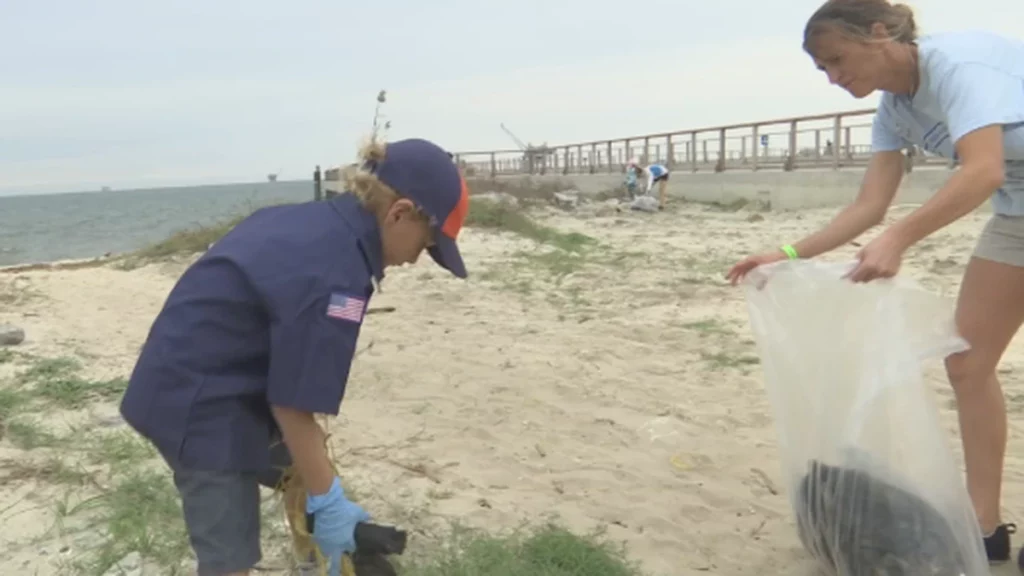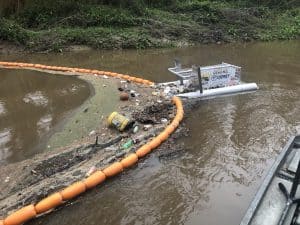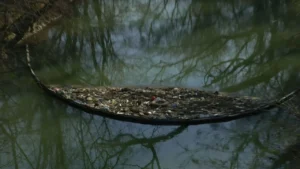MOBILE, Ala. (WALA) – With the sound of a blow horn — they’re off — teams of kids and their parents scavenging the grounds of Historic Fort Morgan.
With one hour on the clock — it’s a race to see who can pick up the most trash. The bigger the find – the better the chance to win a prize.
“We found what appears to be a water line… a water pipe. It wasn’t connected to anything though… (laughs),” said one woman.
“We found lots of trash and piece of rebar and we found some of this police yellow stuff… Police yellow stuff.. We found caution tape (laughs),” said a boy and his mom.
“We found a piece of plastic in one of those holes — that’s part of the Fort — some old caution tape, and a brick which might not count,” said one man.
This is the 2nd Annual Litter Rodeo, which all started as a pandemic pass time by 7-year-old Oliver Caver.
“Lee: What do you think about all of these people helping you out? — Oliver: Well, it is cool. It’s really, really cool. It saves the sea turtles.”
Even Oliver’s Cub Scout pack is getting in on the fun — the event teaching them it’s never too early to start picking up trash.
“I think it’s awesome. I really do. Even when we are out. I go fishing out on the beach — we try to pick up trash. So this is just something we could take our kids out — and teach them something good,” said Westley Hamner, just moved to the area.
“We love the initiative and the fact it’s a child and we’ve got all these children out here starting young — so hopefully when we see trash in town – you pick it up — so that it doesn’t make it to the water,” said Lorri & Tucker Rhodes, Gulf Shores.
To educate people on the importance of cleaning area beaches — Oliver wrote a book — and his parents have started the non-profit Cleanhorizons.org.
“I just can’t say how cool this event is because the parents get to team up with the kids and it’s probably the first time these families have ever been able to compete together to win prizes and it’s picking up litter — so it’s like double positives everywhere,” said Ryan Caver, Oliver’s dad.
This year they’ve partnered with Mobile-based litter experts Osprey Initiative — to hopefully take the litter rodeo to the next level.
“We pick on it… We call ourselves litter nerds and we are just focused on protecting these waters. As part of it — you just meet passionate people. We heard about Oliver, Ryan, the Caver family — Maggie — and then you run across them. It’s just people of like-mind, like-passion, and very similar passion and very similar ethics of what we are trying to do… So it was a natural fit,” said Don Bates, Osprey Initiative Owner.
With another sound of the horn — it’s weigh in time and as we found out — every little bit counts.
Haulling in a bag, including an old tire — one team hoped it would put them over the edge. And after surveying the teams — they should also have a prize for the strangest finds.
“Reese Swann, 10-years-old: We were just walking over there and we found like bullets. Lee: What kind of bullets? — Reese: I have no clue. Do you know what type? We don’t know we just found them.”
“Lee: What did you find here? — Group of kids: A bird skull. Lee: I heard you wanted to keep it? — Girl: I do — I want to keep it because I might be able to make something out of it.”
When it was all said and done — J.J. Pierre came in first taking home some cool fishing gear.
“I’m going to go fishing with my dad. Lee: What are y’all going to catch? — J.J. Big fish!”
With more than 341 pounds of trash picked up — there’s no doubt the real winner for the 2nd year running is the environment. They had more than 70 participants this morning and we’re told every child walked away with a prize.
This story originally appeared on WALA FOX 10. You can view the original story online herel




